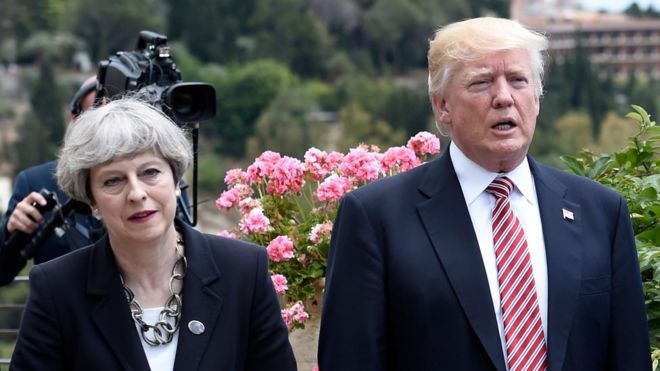
When it comes to the UK election,
Americans have hardly been grabbing the popcorn. Box office it is not.
And up against the summer blockbuster of the Trump presidency it looks
more like a village hall production - the vicar's daughter playing the
lead.
Modern-day movie-goers like franchises, with characters and
plotlines that are instantly recognisable; with over-arching themes that
comport with a broader narrative. The French presidential election
fitted that bill, with Marine Le Pen cast as the female Trump, the face
of populist fury. But May versus Corbyn - it feels like an indie production with a very limited cinema release, a few movie theatres perhaps in Washington, New York and Boston.
Brexit worked on the franchise front. The prequel to Trump's unexpected victory last November, it truly was an epic. But the UK general election doesn't even feature Nigel Farage, one of the few British politicians American viewers are familiar with.
It's not even accurate to call it a forgettable election. Most Americans, I feel confident in saying, aren't aware it's even taking place.
Articles have appeared in the quality press. But they've felt perfunctory, dull but worthy yarns to mark something editors feel is vaguely important but not ones that demand front page attention. Where's the drama? Where are the unexpected twists? To stretch the movie metaphor to breaking point, where is Helen Mirren or Hugh Grant?
More UK Election
- Parties and their manifestos
- Poll tracker
- The places where Britons can't vote for a female candidate
But the other stories to cut through here in recent months have mostly involved the royal family. Prince Philip's retirement from public duties. The young royals admirable decision to talk openly about their mental health.
A small digression here. America's longstanding fixation with the royal family is not as historically anomalous as it seems. The American Revolution wasn't a rejection of the British monarchy, it was a rejection of the British parliament.
America's royal obsession sometimes has the feel of a cargo cult on a small Polynesian island, but its faithful to the thinking of some of the country's leading founding fathers.
History. That's what continues to fascinate Americans about Britain, not its modern-day politics. That's evidenced by the enormous popularity of the Netflix drama The Crown.
The heritage theme park view of the UK still persists here, and maybe Brexit reinforces it, because of its nostalgic overtones. It's the period dramas that always do well here rather than gritty social realism. Masterpiece Theatre rather than Mike Leigh.
I'm always intrigued, for example, by the reaction of American politicians to Boris Johnson. Senior Republicans and senior administration officials absolutely love him.
Entertainment. That's become a big part of American electoral politics, with Donald Trump not just blurring the lines between politics and celebrity culture but turning them into the self-same thing.
His campaign became a reality show, with all the exaggerations and absurdities that we've come to associate with the genre. That, in ratings terms, is the problem with the British election. To the few American eyes that have bothered to peer over the Atlantic, it's just boring old reality.
0 comments: